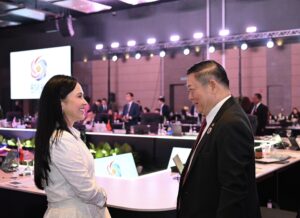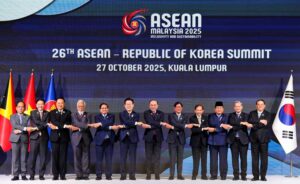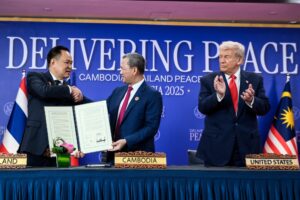Charting a responsible AI transition for Southeast Asia’s workforce
Artificial intelligence (AI) is set to fundamentally disrupt the nature of work and economic structures worldwide, presenting a significant opportunity for developing economies to boost productivity and generate socioeconomic development. AI could increase Southeast Asia’s GDP by 10–18 per cent by 2030. Unlocking this potential in an inclusive way that does not amplify existing divides will depend on how ASEAN acts to create a resilient AI-ready workforce.
The disruptive impacts of AI are not limited to technology sectors. A report by the AI Asia Pacific Institute, in collaboration with LinkedIn, highlights how 164 million workers — over half of ASEAN’s labour force — are expected to experience disruptions from generative AI in two ways. Automation of repetitive tasks will lead to the reduction and displacement of roles, while augmentation of complex analytical and decision-making activities will lead to the enhancement of other roles. This drives a growing need for a skills-based approach to education and employment, focused on continuous lifelong learning that combines subject matter expertise with digital literacy and adaptability.
Traditional education and training cycles, created in an era of relatively stable job markets, struggle to meet the challenges of the AI era. The skills needed for jobs in Southeast Asia are expected to change by 72 per cent from 2016 to 2030, compared to only 40 per cent from 2016 to 2025.
In the healthcare sector, where there are chronic skills shortages, clinicians are expected to move towards higher-value, technology-supported roles that involve overseeing AI-powered triaging and diagnostic systems. But administrative roles — disproportionately performed by women — are at a high risk of being automated. In the agriculture sector, which employs one-third of the region’s workers, up to 5.7 million jobs could vanish by 2028.
Without timely reskilling and upskilling initiatives to support transition pathways and accompany AI-enabling infrastructural investments, such as data centres and energy hardware, much of ASEAN’s population is at risk of missing out on the opportunities AI creates.
ASEAN economies are particularly vulnerable to the risks of AI-driven workforce transformation. Over 60 per cent of the region’s population is under the age of 35. This presents an enormous demographic dividend that can drive continued growth. ASEAN youth are digital natives who are generally more willing to engage with emerging technologies. If supported by effective skills initiatives, they could be well-positioned to navigate the AI era and contribute to the region’s digital future. But inaction risks generating systemic underemployment.
Around 20 per cent of ASEAN’s population still lacks internet connectivity despite major strides in digital transformation. These pre-existing digital divides will prevent people from accessing AI systems, particularly affecting rural and low-income communities, even in more digitally mature countries like Indonesia and Thailand.
ASEAN is heavily reliant on micro, small and medium enterprises, which account for 85 per cent of employment and 45 per cent of GDP in the region. Empowering these enterprises at the grassroots level is key to harnessing the productivity gains of AI at scale to inclusively catalyse economic growth. But a lack of resources and know-how to effectively adopt AI and support staff skilling means the benefits are likely to predominantly flow to large enterprises.
Ensuring AI’s benefits are inclusively shared with vulnerable, underserved cohorts is not merely a matter of fairness but the foundation of a successful socioeconomic transition. A just AI transition requires a coordinated regional response linking AI policy and governance to human capital development. This should leverage the ASEAN Working Group on AI Governance and the proposed ASEAN AI Technical Assistance Facility, which aims to support member states in effectively implementing the national and regional AI strategies that underpin flourishing responsible AI ecosystems.
ASEAN must create a common AI workforce framework to facilitate regional standardisation of terminology and competency benchmarks for AI roles. This would enable mutual recognition pathways for digital skill credentials. Interoperability across ASEAN’s diverse economies and labour markets will be key to promoting longer-term collaboration and policy alignment.
A network of AI Excellence Centresconnecting institutions in areas where ASEAN members have established and emerging expertise would facilitate strategic knowledge transfer and reduce duplicate efforts. For example, Indonesian and Philippine institutions could collaborate on specialised agricultural AI applications and work to diffuse know-how to countries that lack the capabilities or resources to innovate at the same pace.
A digital transformation fund would support equitable development for ASEAN members and underserved communities at early stages of their digitalisation and AI journey. This will require contributions from economically mature members and multilateral institutions, as well as negotiated commitments from the technology companies benefitting from ASEAN’s digital economy.
These efforts must be supplemented with industry initiatives to ensure AI adoption supports shared growth rather than deepening inequalities, through mechanisms like ‘inclusive businesses’ and ‘impact investing’ — which ASEAN actively encourages. Inclusive businesses can implement scalable, commercially viable models that deliver AI training, tools and employment pathways to bridge digital divides and build resilience against job disruption. Impact investors can provide the patient capital needed to scale AI innovations, de-risk early-stage ventures and align financial returns with measurable social outcomes like job creation, skill development and gender equity.
With global geopolitical uncertainty and an intensifying AI arms race, the pace of AI innovation and the opportunities and risks it brings are immense. Passivity threatens to make AI a fragmenting force that undermines ASEAN’s long-term competitiveness and development. But with timely investment and considered action to create a future-ready workforce, ASEAN can equitably harness AI to support inclusive prosperity and economic resilience.
Kelly Forbes is President and Executive Director of the AI Asia Pacific Institute.
Peter Brimble is Board Member at the AI Asia Pacific Institute.
David Hua is a researcher at the AI Asia Pacific Institute.
Source: East Asia Forum





